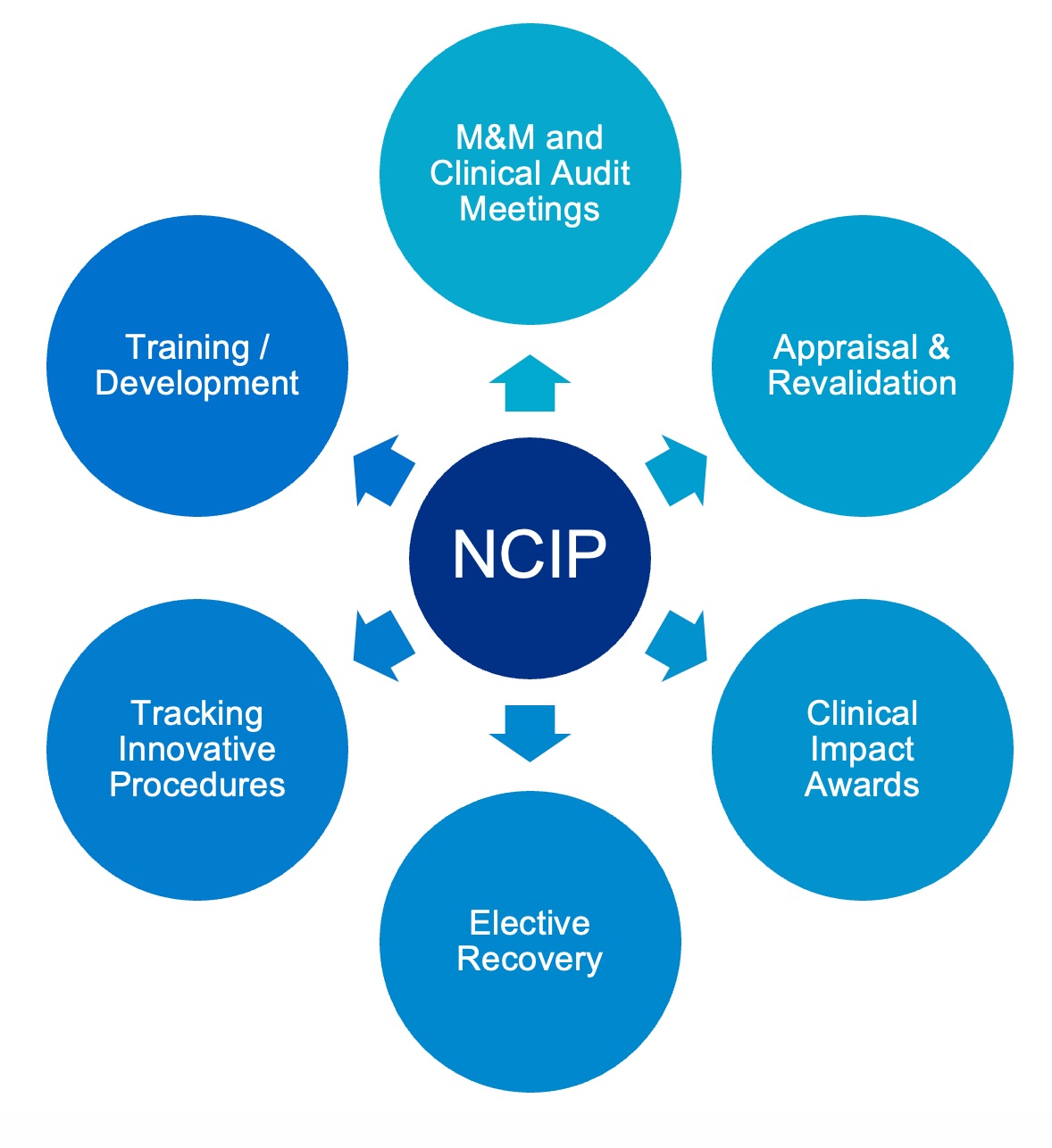National Consultant Information Portal
About
NCIP, initiated in 2018, is a critical part of the response to the Paterson Inquiry, which recommended there should be a single repository of the whole practice of consultants across England. Consultants can get a unique view of their whole NHS practice, with locally and nationally benchmarked data covering activity and outcomes, down to patient level.
NCIP is a free data platform that allows consultants to review their own data:
- Improving clinical quality
- Enhancing patient safety
- Supporting career development
NCIP provides a single source of robust, nationally benchmarked data, which is updated every three months. The metrics are mostly based on Hospital Episode Statistics (HES), combined with other sources including Office of National Statistics (ONS) mortality and deprivation data.
A founding principle of NCIP has been that it should be a resource for the profession, led by the profession. NCIP has been developed by clinicians, for clinicians. Our clinical leads, other consultants and data experts work together to create dashboards that are accurate and meaningful for each featured specialty.
The portal is being delivered with the support of GIRFT clinical leads. The ambition is to provide a unique service – a single point of access to different types and sources of data that consultants will use to support quality improvement and their personal development and learning.
Who can use NCIP?
NCIP is only available to clinicians and is not available to any clinical or non-clinical NHS staff outside of these groups or the public.
- · Consultants
- · Specialty clinical leads
- · Responsible officers
- · Medical directors
Visit NCIP Log into NCIP
If you need help setting up an account or would like a demo, email the Email not available without JavaScript.
Vascular surgery leads
- Prof Arun Pherwani
- Mr Jon Boyle
Vascular Dashboards
There are 24 vascular dashboards, covering a range of aneurysm, arterial, carotid, lower limb, renal access and venous procedures. The team at NHS England have worked closely with clinical leads, Arun Pherwani and Jon Boyle, to ensure they’re meaningful and clinically relevant for vascular consultants.
|
1
|
Aneurysm
|
AAA repair without rupture | age 17+ | emergency
|
|
2
|
Aneurysm
|
EVAR | age 17+ | elective
|
|
3
|
Aneurysm
|
Open AAA repair | age 17+ | elective
|
|
4
|
Aneurysm
|
Open thoracic aorta repair | age 17+ | elective
|
|
5
|
Aneurysm
|
Ruptured AAA repair | age 17+ | emergency
|
|
6
|
Aneurysm
|
TEVAR | age 17+ | elective
|
|
7
|
Aneurysm
|
Thoracic aneurysm repair (with or without rupture) | age 17+ | emergency
|
|
8
|
Arterial
|
Aortic dissection | age 17+ | emergency
|
|
9
|
Arterial
|
Biopsy of artery | age 17+
|
|
10
|
Carotid
|
Carotid endarectomy/stenting | age 17+
|
|
11
|
General
|
Percutaneous transluminal insertion/replacement of subcutaneous port | age 17+
|
|
12
|
Lower limb
|
Lower limb angioplasty/stenting for PAD | age 17+
|
|
13
|
Lower limb
|
Lower limb bypass | age 17+
|
|
14
|
Lower limb
|
Major lower limb amputation | age 17+
|
|
15
|
Lower limb
|
Foot or toe amputation | age 17+
|
|
16
|
Lower limb
|
Femoral artery repair | age 17+
|
|
17
|
Lower limb
|
Open embolectomy of femoral artery | age 17+
|
|
18
|
Renal access
|
Insertion/removal of ambulatory peritoneal dialysis catheter | age 17+ | elective
|
|
19
|
Renal access
|
Insertion/removal of ambulatory peritoneal dialysis catheter | age 17+ | emergency
|
|
20
|
Thoracic outlet procedures
|
Thoracic outlet procedures | age 17+ | elective
|
|
21
|
Venous
|
Insertion or creation of arteriovenous shunt | age 17+ | elective
|
|
22
|
Venous
|
Percutaneous transluminal vein procedures | age 17+
|
|
23
|
Venous
|
Percutaneous transluminal venous thrombolysis | age 17+
|
|
24
|
Venous
|
Varicose vein repairs | age 17+ | elective
|
NCIP currently only displays inpatient activity, which may impact varicose vein volumes.
Information Governance
Individual consultant-level data will not be available for external publication. The data can only be accessed by individuals registered via their Trust to use the portal and seen only by the consultant it relates to and their senior responsible officer and medical director.
Why use NCIP?
Patient safety
View your NHS activity across all providers in one place.
Drill down to patient level information to review post-surgical outcomes, eg 90 day mortality, 5 year aneurysm repair revision data
Clinical quality
Use in clinical audit and morbidity and mortality meetings.
Use across teams for quality improvement and track the use of innovative procedures.
Learning and development
Export data to use as high-quality evidence for appraisal and revalidation, for individual and team learning, and in research or applications for clinical impact awards.
Leadership and oversight
Embed at all levels of leadership, with enhanced access giving medical directors, responsible officers and specialty clinical leads oversight of all consultants they are responsible for.
